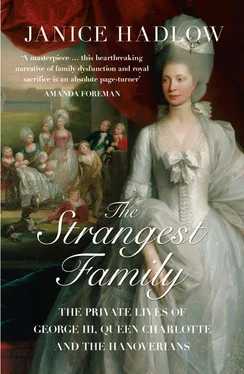Hervey thought these ‘sudden sallies of temper’ were ‘unaccountable’. He did not understand that they were a product of George’s increasing desperation, for his anger mounted as his wife grew steadily worse. At first, no one knew exactly what was wrong. She would not allow any doctors to attend her and permitted no one to examine her. When they were alone, Hervey often heard her cry: ‘I have an ill which nobody knows of!’ He took that to mean ‘nothing more than she felt what she could not describe’.
Her husband knew better. As days went by, and Caroline ‘complained more than ever of the racking pains she felt in her belly’, George decided enough was enough. He whispered to her that ‘he was afraid her illness proceeded from a thing he had promised never to speak of to her again; but that her life being in danger’, he was obliged to tell everything he knew. Caroline ‘begged and entreated him with great earnestness that he would not’, but the king sent for Ranby the surgeon ‘and told him that the queen had a rupture at her navel, and bid him examine her’. It took Ranby only a few minutes to confirm the diagnosis. Caroline ‘made no answer but lay down and turned her head to the other side, and as the king told me, he thinks it was the only tear she shed while she was ill’. 78
George told Hervey that he had first noticed the injury fourteen years before, after Caroline had given birth to their last child, Louisa. She told him ‘it was nothing more than what was common for almost every woman to have had after a hard labour’. When it did not improve, he had urged her to consult a doctor, but she refused and begged him to say no more about it. When he came back from his extended trip to Hanover in 1736, he thought it had become much worse. He told her he was certain it was a rupture. Caroline responded with uncharacteristic fury, ‘telling me it was no such thing, and that I fancied she had a nasty distemper, which she was sure she had not, and spoke more peevishly to me than she had ever done in her life’. The more he begged her to ‘let somebody see it’, the more determined she became to reveal it to no one. ‘I at last told her I wished she might not repent her obstinacy, but promised her I would never mention this subject to her again as long as I lived.’ These conversations took place at the height of the king’s passionate affair with Mme de Wallmoden, and even the determinedly unimaginative George suspected that his infidelity had coloured the way his words had been received by his hurt and resentful wife. ‘In as plain insinuations as he could,’ he told Hervey that Caroline believed it was because of her injury that he had ‘grown weary of her person’. Hervey was astonished that ‘an ill-timed coquetry at fifty-four that would hardly have been acceptable at twenty-five’ had been allowed to exacerbate the queen’s complaint; but he was forced to accept the truth of it. ‘Several things she afterwards said to the king in her illness … plainly demonstrated how strongly these apprehensions of making her person distasteful to the king had worked upon her.’ 79
Caroline suffered from an umbilical hernia, a condition in which internal pressure or congenital weakness forces part of the intestine through the stomach wall. As she told George, it can be caused by difficult labour, or through other side effects of pregnancy. Now it can be resolved by an operation usually simple enough to be performed as day surgery. In the eighteenth century, there was little that could be done. The doctors debated how best to proceed. One proposed ‘cutting a hole in her navel big enough to thrust the gut back into its place, which Ranby opposed, saying all the guts, on such an operation, would come out of the body, in a moment, on to the bed’. The wound had begun to mortify, and Caroline was subjected to a great deal of pointless agony as the doctors tried to cut away the infected areas around it. But they all knew there was nothing useful that could be done; and Ranby soon told George that the queen could not survive.
Caroline knew it too. She had declared from the beginning of her illness that she was dying. She summoned her family around her to take leave of them, and said goodbye to them one by one. ‘She took a ruby ring from her finger that the king had given her at her coronation and putting it on his said, “This is the last thing I have to give you – naked I came to you and naked I go from you.”’ As the king wept, she urged him to marry again, ‘upon which his sobs began to rise, and his tears to fall with double vehemence. Whilst in the midst of this passion, wiping his eyes and sobbing between every word, he got out the answer. “ Non – j’aurai – des – maîtresses .” To which the queen made no other reply than “ Mon Dieu! Cela n’empêche pas .”’ 80In death, Caroline was as resigned as she had been in life to the curious mixture of passion and selfishness with which her husband had declared his devotion to her.
There was one conspicuous absentee from her deathbed farewells. As soon as he heard his mother was ill, Frederick asked permission to come and see her. George was incensed, telling Hervey that if the prince appeared at St James’s, ‘I order you to go to the scoundrel, and tell him I wonder at his impudence for daring to come here … Bid him go about his business, for his poor mother is not in a condition to see him now act his false, whining cringing tricks.’ 81However, when the queen asked if there had been any messages from Frederick, the king relented. He would do anything to please his dying wife, even to the extent of admitting his hated son back into the house from which he had been so recently ejected. He told Caroline ‘that if she had the least mind to see her son, he had no objection to it, and begging her to do just what she liked’. Caroline was implacable. She told George she would not see him again, and that if she grew worse ‘and was weak enough to talk of seeing him, I beg, sir, that you will conclude that I dote and rave’. She did neither; Hervey reported that until the moment of her death she never spoke of the prince ‘but always with detestation’. She told the king and her daughter that ‘at least I shall have one comfort in having my eyes eternally closed – I shall never see that monster again’.
She finally died, after ten days of suffering, on 20 November. George ‘kissed the face and hands of the lifeless body several times’ and went silently to his apartments, which he did not leave for several weeks. He took Hervey with him, and ‘during this retirement … showed a tenderness of which the world thought him utterly incapable’. Everything he did and said, thought Hervey, proved how much he had loved and admired the woman he had lost. Hervey was amazed to hear the usually blunt and unsentimental king describe so feelingly what she had meant to him, ‘the tender manner in which he related a thousand old stories relating to his first seeing the queen, his marriage with her, the way in which they had lived at Hanover, his behaviour to her when she had had smallpox and his risking his life by getting it off her (which he did) rather than leave her’. 82
He also recalled more recent times, ‘and repeated every day, her merits in every capacity with regard to him’. Unsurprisingly, he praised her complete submission to his will. ‘He firmly believed, she never, since he first knew her, ever thought of anything she was to do or say, but with the view of doing or saying it in what manner it would be most agreeable to his pleasure or serviceable to his interest.’ But he also acknowledged ‘that she had been of more use to him as a minister than any other body had ever been to him or any other prince’. It was an astute assessment of Caroline’s virtues in the public world; yet it was in her role as the lodestone of his private world that he knew he would miss her most. ‘She was the best wife, the best mother, the best companion, the best friend and the best woman that ever was born.’ He firmly believed that ‘he had never seen her out of humour in his life, though he had passed more hours with her than he believed any two other people in the world had ever passed together, and that he had never been tired in her company one minute’. He concluded with a compliment which Caroline would surely have understood was the highest accolade he could bestow on her: ‘He was sure that he could have been happy with no other woman upon earth for a wife, and that if she had not been his wife, he had rather had her for his mistress than any other woman he had ever been acquainted with.’ 83
Читать дальше












